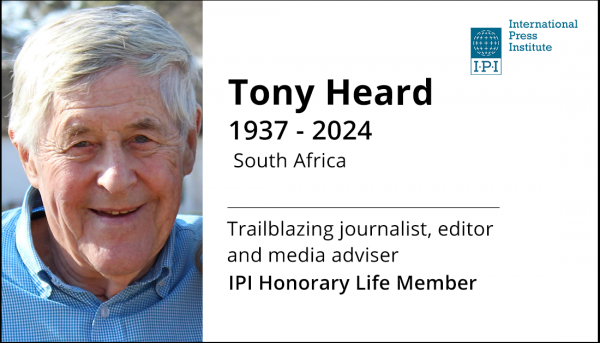The International Press Institute (IPI), the global network of editors, leading journalists and media executives in over 120 countries, is disappointed at the decision of the Bloemfontein High Court to disregard the qualified right of journalists to keep their sources confidential.
According to information provided to IPI, on 11 November Judge President J.P. Malherbe, sitting at the Bloemfontein High Court, upheld the ruling of Judge Joos Hefer that Ranjeni Munusamy must testify before the Hefer Commission.
In reaching its decision, IPI is of the opinion that the court missed a significant opportunity to bring South African law into line with international and foreign law by following a course of argument that would have enabled it to conclude that a qualified right of confidentiality exists for journalists practising their profession.
Under section 39 (1) of the South African Constitution “When interpreting the Bill of Rights, a court, tribunal or forum: (a) must promote the values that underlie an open and democratic society based on human dignity, equality and freedom (b) must consider international law; and (c) may consider foreign law”.
When considering the above, IPI views the qualified right of journalists to keep their sources confidential to be an essential part of an “open and democratic society” and that in examining this argument the court could have given greater weight to international and foreign law.
With section 39 (1) (b) providing an injunction to the court to interpret South African law in light of international law, IPI believes the court could have been persuaded by the decision of an appeals panel of the United Nations War Crimes Tribunal in the Hague which overturned a decision compelling Washington Post journalist Jonathan Randal to testify before the tribunal.
In making its decision the panel accepted the danger posed to journalists if forced to testify and said journalists could only be compelled if the information is “direct and important” to the case and could not be obtained from other sources. There are also a number of important cases decided before the European Court of Human Rights (ECHR) which could also have a direct bearing on Munusamy’s case.
Although not constrained to do so, IPI takes the views that the question of confidentiality is of such import that the court could also have accepted the need to follow section 39 (1) (c) and “foreign law” on this issue. Had the court done so it would have found a raft of case law and regulations that support a qualified right of confidentiality for journalists.
Of particular importance are the US Department of Justice’s (DoJ) guidelines on the issuance of subpoenas to the news media developed after the landmark US Supreme Court case of Branzburg v. Hayes. The guidelines state that in order to subpoena a journalist the DoJ must show that the information sought was (a) highly material and relevant; (b) necessary or critical to the maintenance of the claim or defence; and (c) not obtainable from other sources.
Based on the above interpretation of international and foreign law, IPI believes it would have been possible for the South African High Court to construct a suitable legal framework that provided a qualified right of confidentiality.
According to the judgement of Judge President J.P. Malherbe, “[Munusamy] is the primary source of information about her investigations. The obvious place to start is where the ‘story’ begins”. IPI would argue that the sole reason that Munusamy is the start of the “story” is because her sources believed her to have a duty of confidentiality.
Therefore, the court’s decision places the Hefer Commission in the somewhat curious position of denying the existence of a journalist’s right of confidentiality while in the same breath seeking to take advantage of it.
IPI takes the view that there are also sound public policy reasons why a journalist should be able to keep her sources confidential.
The denial of this right will seriously impede the work of South African journalists who in the future will be forced, at every stage of the interview process, to seek legal advice on what conversations they can and cannot be a party to. The overall effect will be an extreme deterrence on individuals coming forward to provide information that is in the public interest.
As a result, South African society will lose one of its best methods of fighting corruption and reviewing the work of the legislature and the executive.
At the heart of this argument is the principle of the free flow of information which should not be hindered by individual attempts to capitalise on the work of journalists; particularly when at jeopardy is the very concept of a journalist’s right to report freely. The benefits that flow from this work touch upon every aspect of South African society and should not be so easily surrendered for short-term gain.
It is IPI’s opinion that the Hefer Commission has been allowed to pursue the path of least resistance and that the Commission should have been duty bound to exhaust all other possibilities before turning to the media and endangering the free flow of information in South Africa.


